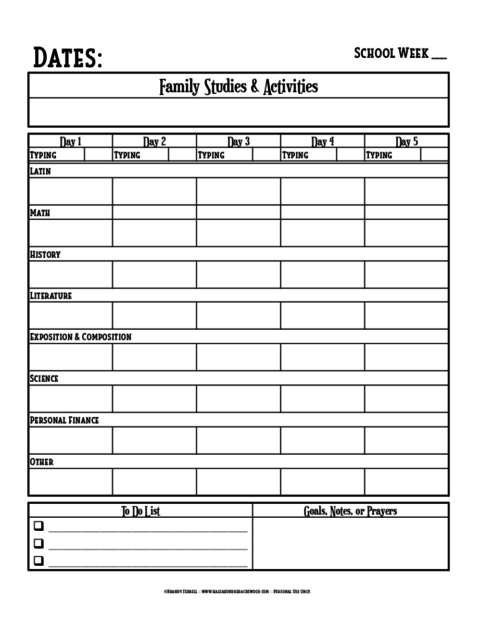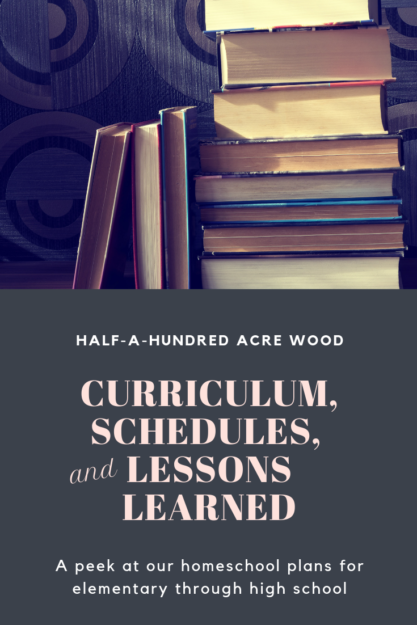
Every year we receive this question, and every year I hesitate to share our plans with others. When it comes to homeschooling, I don’t have it all together, but I do enjoy putting it all together. I love to set goals with my children, and I love learning with them. It’s one of the biggest reasons we homeschool. But oftentimes posts like this are misinterpreted. So, before providing a sneak peek at our curriculum selections, I wanted to start with my top lessons learned from our first 10+ years of homeschooling.
Lessons Learned from a Decade of Homeschooling
- Seek first the kingdom of God. Loving God and fellow man (including siblings) takes precedence over everything else.
- Relationship is far more important than curriculum and lesson plans. Get to know your children and their interests. Seek opportunities to encourage them in those interests, but also hold them accountable to do their best in whatever they do.
- Young children operate best with short 15-minute lessons and plenty of time to explore nature and use their hands. (Boys especially struggle with sitting at a desk for long periods of time. We’ve completed our book work on the playground, the trampoline, the patio, sitting upside down in a chair…)
- Reading together provides an opportunity to build your family’s relationships through shared stories and discussion. During family read aloud time, it’s okay if children are using their hands (playing with LEGOs, coloring, etc.). In fact, we’ve found that it’s necessary.
- Give yourself and your children the grace of tapering into the school year, taking breaks when needed, and doing whatever needs to be done in the midst of your real, everyday life.
- Be prepared, but hold your plans and expectations loosely, for God may have a special unexpected purpose for your family to pursue.
- Focus on learning and character-building rather than grades and test scores (at least until middle or high school).
- Resist falling into the trap of comparison. Do what’s best for your family, regardless of what others say.
- Choose joy. Learning can be hard, but it’s also exciting and rewarding. If you’re filled with a sense of dread as you enter a new school year, it’s time to change what you’re doing.
- If you’re new to homeschooling, start simple. Reading, writing, and arithmetic. These are the foundational skills needed for learning anything. Add other things when you discover interests and giftings.
- Be confident but also recognize that plan doesn’t equal reality. As with starting anything new, it may be a rocky road at first. (Remember, mercy triumphs over judgment!) Pray for guidance, wisdom, and grace, and lay all your efforts at the feet of Jesus. It’s all for Him anyway!
Our family made some tough decisions in the past year or two that totally changed our direction. (You can read that story here.) In short, after several years down a certain road in our homeschool journey, our family decided to return to the original reasons we chose to homeschool in the first place. And instead of the dread that our family had come to experience at the beginning of each school year, our home is once again filled with joy and excitement as we approach a new year. Homeschooling is good stuff. I had forgotten how good it is.
As I share this, remember that first of all, it can look more foreboding on paper than in real life. Second, start simple and figure out what works well for your family. And last, this is simply to provide a peek at what we’ve chosen after reviewing a ton of different curriculum and books. Perhaps there’s a treasure here for your family to discover, too!
Curriculum Choices
We now have students at every level: lower elementary, upper elementary, middle school, and high school. (You can just scroll to the level of interest and ignore the rest. You can also scroll down to see an example schedule – written with upper elementary students in mind.)
Family Morning Time
Our family starts together with morning time which takes about 1-1.5 hours, part of which is over breakfast. This is our most special time, and our teenagers love to be a part of it. After that, our older students are fairly independent in their individual work and just ask questions as they need my assistance. After morning time, most of my day is spent on teaching reading and writing (kindergartner), formal writing (5th grader), and spelling (5th and 8th grader).
- The 10 Minute Bible Journey
- Mission: Faith Forgers (Plan includes missions/church history, world history (1500s-modern day), hymns, art, music, geography, science, scripture memorization, and read alouds)
Kindergarten
Kindergarten is a time of discovery and exploration. At this age, we go at a pace that fits the student. Our family spends a lot of time reading aloud to our youngest. We aim to keep our schedule and curriculum choices limited to reading, writing, and arithmetic until about 2nd or 3rd grade. (Starting in 1st grade, writing includes spelling and English grammar.)
- Reading: All About Reading Level 1. Read more about this program here.
- Writing: Script-n-Scribe Roller Coaster Writer
- Arithmetic: Learn numbers, counting, single-digit addition, measurement, and telling time. Learn to write numerals with Roller Coaster Writer.
Upper Elementary (5th grade)
Starting in 4th grade, we add Latin and more formal writing with IEW’s program.
- Personal Bible Study: Gospel Story Bible (10 minutes)
- Penmanship: Hymns in History (5-10 minutes)
- Math:
Beast Academy(45 minutes). Mid-Year Update – while we enjoy Beast Academy’s comic books, we found that the workbooks were a bit too challenging. We’ve defaulted back to Saxon 76. - Language arts:
- Spelling: All About Spelling Level 5 (20 minutes) Read more about this program here.
- English Grammar: Fix-It Grammar – Level 2 (15 minutes) Teacher’s Manual comes with a downloadable student book. Read more about Fix-It Grammar here.
- Exposition & Composition:
IEW World History-Based Writing Lessons(45 minutes). After we started the school year, we decided to switch to Fables, Myths, and Fairy Tales because it introduces the same structures & styles but is more appropriate for children in Grades 3-5.
- Latin: Visual Latin 1 (20 minutes). Download 2 free lessons here.
- Other: Poetry review/memorization for 5-10 minutes. Independent reading for at least 30 minutes from assigned literature or student’s choice.
Two weeks from our 5th grader’s schedule:
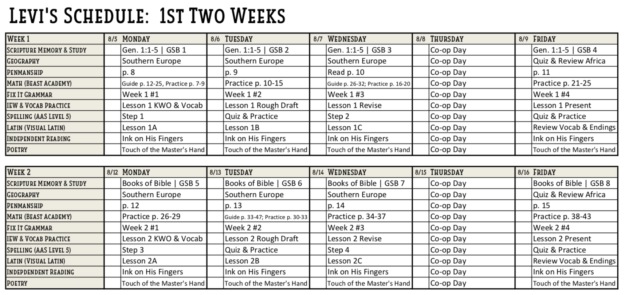
It looks like a bunch, but most of it is language arts, and he is usually done with his school day by 2pm. Our scripture memorization follows the Mission: Faith Forgers plan and will be reviewed during family morning time. Geography also follows the Mission: Faith Forgers plan with a review of geography from Mission: World Wonders once per week. (I listed these on his syllabus just to remind him what he’s to be reviewing each day. But, we also cover science, history, missions, hymns, and fine arts during our family morning time.)
Middle School (8th grade)
Our middle schooler’s core subjects are Math, Latin, Logic, Exposition & Composition (which includes current events), and Science/Research. He also will be reviewing geography and reinforcing spelling skills by participating in his younger brother’s spelling lessons.
- Personal Bible Study: Gospels, Acts, Romans. Additional reference: What the Bible Is All About
- Math: Principles of Mathematics II from Master Books
- Latin: Visual Latin 1. Download 2 free lessons here and read a detailed review of this program here. Also download this Free Visual Latin & Henle Teaching Guide if you’re using Henle First Year Latin.
- Exposition & Composition:
Cover Story(24 weeks), Grammar of Poetry (12 weeks). Instead of using Cover Story as his core writing curriculum, our middle schooler has opted to use this in his spare time. He felt the need to return to formal essay and inventive writing using IEW’s Teaching Writing Structure and Style, so we’re using IEW World History-Based Writing Lessons, which fits in well with our Mission: Faith Forgers curriculum. Update: He also completed Grammar for Writers this year to brush up on some of his grammar as he writes a novella. - Logic: Introductory Logic: Fundamentals of Thinking Well. The recently updated DVDs are extremely helpful! Check out a sample of the new videos at this link. (Intermediate Logic is also available.) Read more about our experience with this program here.
- Science: Exploring Creation with General Science 3rd Edition (Includes history of science, scientific method, introduction to analyzing experiments, origins, earth science, applied science (energy & motion), and life science.)
- Spelling: All About Spelling Level 5
Two weeks from our 8th grader’s schedule:
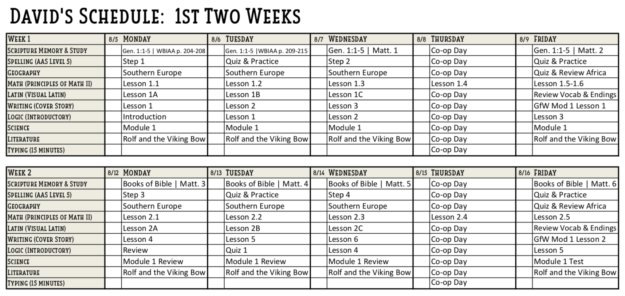
Notes: For typing practice our children have the option of choosing between how-to-type.com or typing.com. Our 8th grader will be learning how to look ahead and prepare supplies each week for science experiments.
High School (11th grade)
- Personal Bible Study: New Testament Epistles
- History: Dave Raymond’s American History and Modernity. (Each course is one credit of history for high school. Because our 11th grader loves history, he has opted to take two history courses this year. American history is his core history credit. He will most likely complete Modernity as an audit course. Download 2 free lessons: American History | Modernity (World History))
- Science: Exploring Creation with Biology.
- Math: Jacob’s Geometry
- Exposition & Composition: IEW Advanced U.S. History Based Writing Lessons with
Excellence in Literature: American Literature.Update: We decided that the Advanced U.S. History Based Writing Lessons contains ample opportunity to write essays without adding in Excellence in Literature assignments. American Literature selections include:- Last of the Mohicans
- Autobiography of Benjamin Franklin
- Uncle Tom’s Cabin
- Adventures of Huckleberry Finn
- The Great Gatsby
- The Boy on the Wooden Box
- To Kill a Mockingbird (a repeat)
- The Old Man and the Sea (a repeat)
- The Chosen (Dad’s choice)
- *Other titles will be chosen from a list of American literature we’ve given him
- Personal Finance (first semester): High School Financial Planning Program (Free program provided from the National Endowment for Financial Education®) Update: We still prefer Dave Ramsey’s course over this one.
- Latin: Finish Third Form Latin, and proceed with Fourth Form Latin. (The Memoria Press First – Fourth Form Latin series is a four-year curriculum that completely replaces Henle First Year Latin. After finishing the form series, students are prepared to enter Henle Second Year Latin.) UPDATE: Because we are enjoying Visual Latin so much (and seeing great success with it!), our high schooler has also decided to complete the entire course along with reading Lingua Latina, a book written entirely in Latin.
- Art: Our oldest son has requested to work through the fabulous Architects of the Ancient World art course from Yellow Spot Sun.
At the beginning of the semester, I hand a simple single-page syllabus to our oldest son (the first two weeks are shown below)…

…and each week he plans out his week using a planner page:
During middle school, we coach them on how to plan their school day so that by the time they enter high school, all they need is a single-page syllabus. It’s such a relief when they get to this point!
If you’d like to take a look at a scope and sequence for fulfilling history credits, visit this post.
Many of the resources below are part of the Compass Classroom Membership, a monthly subscription option allowing homeschool families access to over 30 products. You can test drive all the courses for free for a week!
Schedules
I thought I’d include a sample schedule here, but ours deviates from this quite a bit for our older children. The only thing that remains consistent for everyone is our family morning time. Our older students choose the order in which they complete assignments, so one may be working on math while another is working on Latin. When I’m working with our 5th grader on writing (IEW), his brothers are working on something they can do without my assistance so that they don’t interrupt.
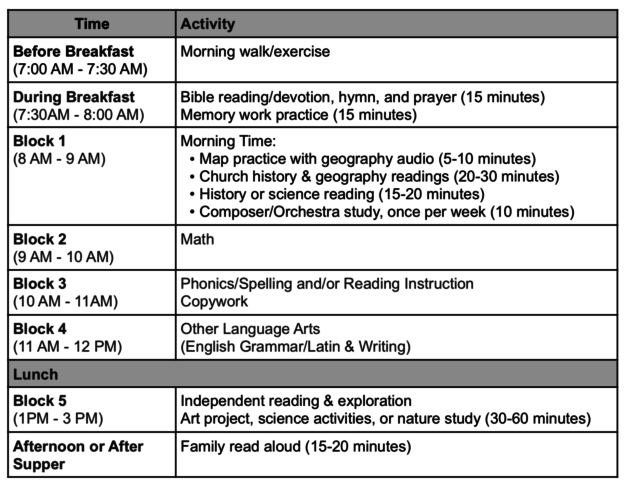
We usually read our read-alouds in the evenings after supper. We also have a Morning Time consisting of short readings and/or activities we’d like to do to jumpstart our school day. (Our Morning Time is Mission: Faith Forgers.) In a more simplistic format, here’s a rundown of what our core, bare-bones schedule sort of looks like (but Block 1 consists of our Mission Faith Forgers Morning Time instead of just Memory work and maps).

If you have any questions about this schedule, about any of our curriculum choices, or about planning in general, feel free to give us a shout!
[I am] confident of this very thing, that he which has begun a good work in you will perform it until the day of Jesus Christ: -Philippians 1:6

